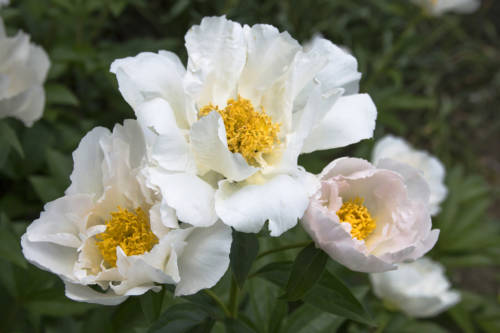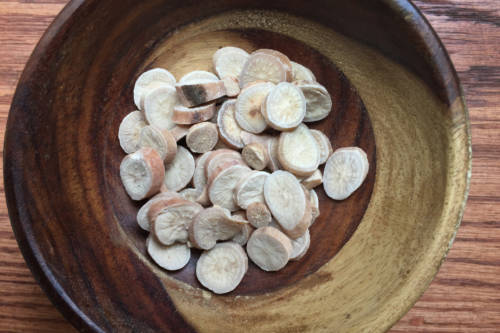Love Peonies? White Peony Root Is Being Used As Herbal Medicine
Peony flowers are a late-spring favorite for gardeners, but, for an herbalist working in clinical practice, it’s the root that holds the most interest. White Peony root, (Paeonia Lactiflora) is often used in traditional Chinese formulas to balance the female reproductive cycle. Historically, it was also used as part of the Ancient Greek medicine system and according to Herbalist Mathew Wood, it was even part of the European Pharmacopeia up until the 19th Century. As White Peony is native to Northern China, if you were to buy it as a remedy in Chinatown you would need to call it by its ‘pinyin’ or Chinese name, which is Bai Shao.
A lesser-known use for this tonic herb is its ability to calm the mind and induce sleep. To understand more about White Peony root’s use for insomnia, we need to look more closely at its herbal actions. In TCM, (Traditional Chinese Medicine), White Peony root is an herb that’s used to nourish the blood–or when the blood is deficient– but, what does that mean?
Deficient blood can be caused by digestion (a.k.a the Spleen as it is known in TCM), the liver, the kidneys, or the heart. The heart and mind have a close connection in Chinese Medicine, and are referred to collectively as the Shen or the Spirit. The Shen encompasses the emotional energy of the heart and the more physical presence of the thinking mind. If the blood is not nourishing the heart, then the mind will be agitated and the Shen will lack foundation. Without the grounding energy to hold the Shen in place, the spirit will wander, especially at night, and this in turn may cause restlessness, anxiety, depression, and insomnia.
Understanding the source of the stagnation or deficiency in the body is the key to solving the issue at its root, and working with an herbal practitioner would be the simplest way to piece out the puzzle, but if you were to suffer from insomnia and see no improvement with sedative herbs, then you may want to delve deeper to uncover what’s holding your system back from falling in to sleep. If you have pale skin, cold extremities, muscle pain, an agitated mind and fatigue, (possibly with a menstrual imbalance) then deficient blood may be at the cause of your symptoms– and in that case, Peony Root could be one of your herbal allies.
Those interested in herbal remedies for sleep should be advised that Peony root is usually given as part of an individually-created formula, rather than as a single herb extract. Its effects build over time, and its flavor is mildly bitter and sour in taste. If you are feeling adventurous and want to create your own night time blended tea that may help alleviate the symptoms of sleep deprivation due to blood deficiency, then try the recipe below– or better still, go see an herbalist!
White Peony Root Tea for Insomnia
Ingredients
- 1 Tbsp Mimosa Flower (Albizia julibrissin) *
- 1 Tbsp Oat Seed, (Avena Sativa)**
- 2 Tsp Peony Root (Paonia Lateriflora) ***
- 2 Tbsp Schisandra Berry (Schisandra Sinensis)
- 1 Tsp Jujube seed (Zizyphus Spinosa) *
- 1 Tsp Lavender ** (Lavandula Angustifolia)
- 1/2 Tsp Dong Quai (Angelica Sinensis) ***
- 1 Tsp of Fresh Ginger
- Pinch of Cinnamon
Method
- Dry Fry the Jujube seeds until they have changed color but are not burnt.
- Grind the jujube seeds together with the oat seed in a coffee grinder designated for herbs.
- Simmer everything except the lavender and mimosa flowers in a quart of water covered with a lid. After 20 minutes, remove from the heat and add the flowers.
- Steep for 20 minutes or longer. This will keep in the fridge for 5 days.
Note
- Measurements are offered for cut and sifted herbs and will make about 16oz of tea.
- * Herbs available from a Chinese herb supplier only: Kamwo Herbs, or Mayway (for bulk only).
- ** Herbs available from traditional Western Herb suppliers: Online at Mountain Rose Herbs, Jean’s Greens or at your local herb shop.
- *** Herbs available at both Western and Chinese vendors.
Resources
- Chinese Traditional Herbal Medicine: Volume 1 by Dr. Michael Tierra and Lesley Tierra
- The Earthwise Herbal: A Complete Guide To Old World Medicinal Plants by Mathew Wood
- Chinese Medical Herbology and Pharmacology by John K. Chen and Tina T. Chen
- On Blood Deficiency, an article from The European Journal of Oriental Medicine by Giovanni Maciocia
- Personal Conversation with respected Herbalist, Author, Ethno-botanist and founder of Herbalist And Alchemist, David Winston on 10/2/16
Dawn Petter is a practicing herbalist living and working in New York City. She is the founder of Petalune Herbals, and more information on her workshops and class offerings can be found here.




































